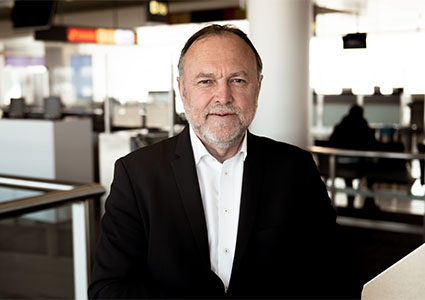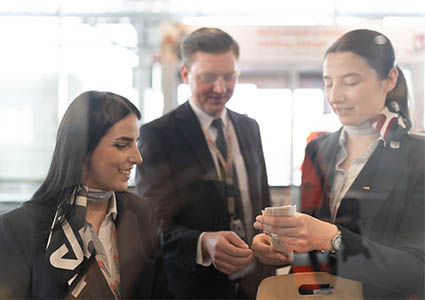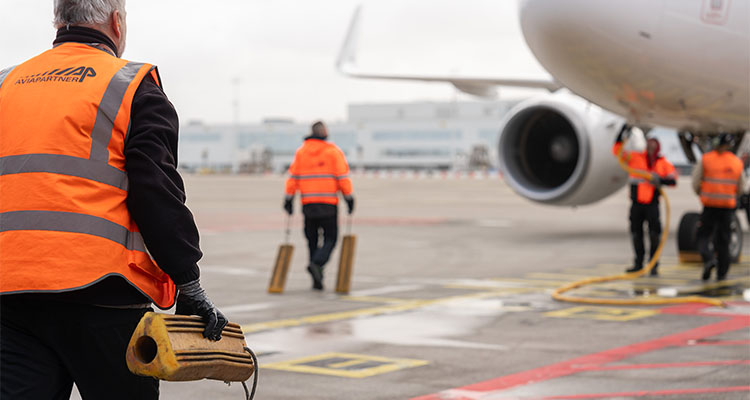Explore how Aviapartner’s diverse workforce and technical expertise set it apart in the ground services industry
Proudly Belgian-owned and based, Aviapartner is Europe’s leading independent provider of ground handling services. “Active across 64 airports throughout Belgium, the Netherlands, France, Spain, Italy and Germany, we expanded our footprint to South Africa a year ago. We now operate in six airports in the country, with our largest hub in Johannesburg and another significant one in Cape Town,” says Philip De Coninck, Managing Director at Aviapartner’s Belgium branch. He delves a little further into the nature of the company’s operations.

“Aviapartner was established in 1949 and currently employs 15,000 people in six European countries and in South Africa,” he begins. “As a Belgian company, we are anchored in Brussels Airport, which has served as our headquarters since 1970. The selection of this location is not a coincidence, as we find Brussels Airport to be one of the most important, innovative, and sustainable airports in the world. Furthermore, it is a truly European hub, making it a particularly attractive place in which to work. We primarily assist flights and their passengers from the moment the plane arrives at its parking place, until it leaves again, or the passengers exit the airport. In total, we serve over 100 million passengers across the globe annually, corresponding to 400,000 turnarounds (one turnaround is an arriving and departing flight). In Belgium alone, we handle 40,000 turnarounds every year. Additionally, we undertake cargo activities, where we handle around 300,000 tons annually across three Belgian airports,” Philip elaborates.
But these staggering figures and key services are just the tip of the iceberg, as Aviapartner manages various other tasks behind the scenes. Philip continues: “Of course, most passengers are aware that we take care of them and their luggage, but we are also heavily involved in scheduling and planning flights, assigning seats, coordinating luggage placement, and organizing the boarding process. In essence, we simultaneously manage the airside and the landside operations on the tarmac surrounding the aircraft. There are many tasks that must be completed in the aircraft, including securing it, ensuring that it is supplied with electricity and water, and loading and unloading. On the logistical side, we manage the supply of pillows and other passenger comfort items for long-haul flights. During winter, we deice the aircraft and make it snow free, alongside the usual cleaning tasks. In addition to these services, we generate and exchange a large amount of data, thus seamlessly coordinating the process between Brussels – or any other airport where we are active – and the destination airport. This wide scope of services is offered to both airlines and the airport itself.”
Successful strategies
Aviapartner’s technical and technological expertise extends beyond mere data exchange, according to Philip. “Alongside my MBA, I have a master’s degree in industrial engineering, with a focus on computer systems and IT. As an engineer, I approach processes and information flows in a highly analytical way. At Aviapartner, my technical skills have proven useful. Indeed, as a data-driven organization, we rely on real-time, accurate information about the processes occurring on the ground which we subsequently communicate with the traffic controllers. This data enables them to effectively manage workers that are on the ground. Furthermore, we provide crucial information to pilots regarding the loading and balance of the aircraft, thereby helping them calculate the quantity of fuel required to reach the destination airport and determine take-off speed, among other considerations. Beyond generating and handling real-time data, we also critically analyze our processes as we continuously strive to integrate new technologies to increase efficiency and improve the quality of the services we deliver to airlines and passengers alike. I believe that my technical background has been instrumental in promoting and pushing developments within our processes. In many ways, we are not just a ground handling services provider, but also a technology company,” he enlightens. 
Philip’s forward thinking enabled Aviapartner to emerge from the pandemic even stronger, though not without having to make difficult choices. “Between April and May 2020, we faced significant ongoing costs and minimal activity, resulting in substantial financial losses. Thus, we considered restructuring, like many other companies, reducing wages, or selling part of our equipment. However, I pleaded strongly with the board not to do any of the above and to keep as many resources available as possible and especially human ones. I was convinced that the aviation industry would quickly rebound after the pandemic, meaning we would need as many qualified staff and as much equipment as possible to avoid chaos. Fortunately, the board agreed and while many European airports experienced difficulties coping with the sudden increase in demand that followed the pandemic, it was not the case in the airports we serve.
“Instead of passively waiting for the pandemic to end, we successfully renegotiated contracts with suppliers and subcontractors to optimize costs. We also focused on increasing efficiency, productivity, and quality in our negotiations with unions, rather than reducing salaries. Retaining our staff throughout this difficult period proved beneficial as our only competitor in Brussels went bankrupt in June 2020, leaving us to handle all flights in the city. While this was a challenge, our management team was already strongly reinforced, and most of our workforce was still on board, allowing us to be fully prepared for this unforeseeable situation.”
Embracing inclusivity
Before concluding our interview, Philip highlights Aviapartner’s appreciation for its diverse workforce. “At Aviapartner, our team comprises people of various ethnicities, nationalities, religions, and gender identities. We fully embrace inclusivity, which can sometimes be challenging due to language barriers, for instance. Hence, communication can be complicated, but we invest in fostering differences and making our company a diverse workplace. Additionally, we make sure to consider our staff’s personal needs and preferences, such as for days off, in exchange for the extreme flexibility we require from them due to the nature of the aviation environment. By doing so, we aim to create an inclusive, positive, and safe workplace for all our employees,” he ends.
Under Philip’s forward-thinking leadership, Aviapartner leads the way in the ground services industry by empowering clients and staff alike through data-driven partnerships and an inclusive ethos within its growing airport network.
